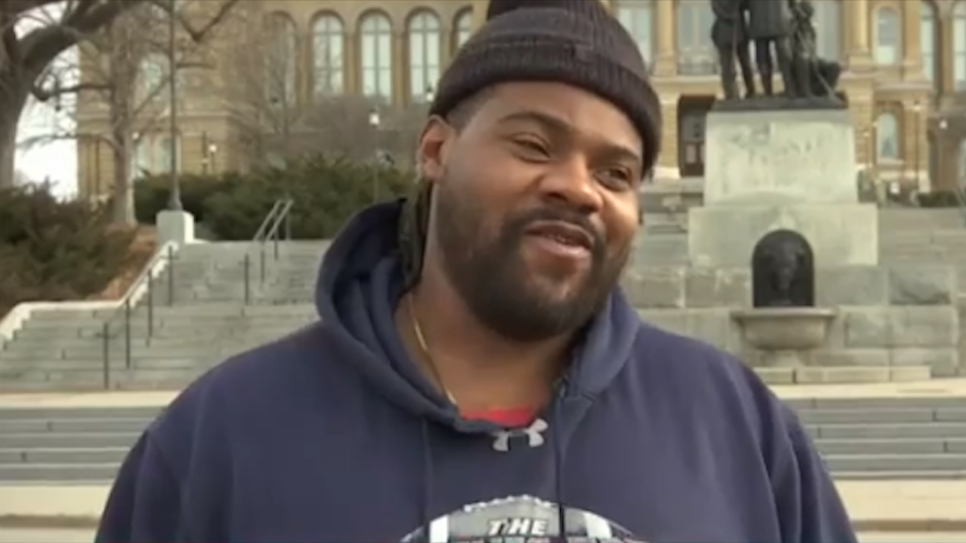If you’re interested in sharing your opinion on any cultural, political or personal topic, create an account here and check out our how-to post to learn more.
____
It’s common for people to believe that everyone in America can vote if they want to. I had my voting rights taken away, so I can tell you that’s not true. I’m from Des Moines, Iowa, and stand ready to reclaim my voting rights. My ability to vote in the first-in-the-nation caucus on February 3 is at the mercy of Iowa Governor Kim Reynolds.
Iowa is first in the nation to vote, but last in the nation on voting rights. It’s currently the only state that permanently bans people with felony convictions from voting. The only exception is to petition the Governor’s office. It doesn’t have to be this way. Voters should be picking their politicians, not the other way around.
In January we celebrated Martin Luther King Day, and with Black History Month following in February, now is a good time to remind people that voter suppression is alive and well in 2020. Many felony disenfranchisement laws have their root in the explicitly discriminatory policies of Jim Crow. To this day, these laws have the undeniable effect of diminishing the political power of minority and underserved communities. (As if it wasn’t hard enough just to get a job with a felony conviction.)
Over one third of voters disenfranchised by these laws are Black. Nationwide, one in every 13 Black adults cannot vote as a result of a felony conviction. I want to vote in the upcoming election so my son can be raised in a better place and not become one of these statistics. I want him to go to college and see the world, avoiding the mistakes I made.
This is what happened.
At the age of 19, I was caught with marijuana. I was a boy at the time. It was my first time getting in trouble, and it led to my incarceration up until 2014. I was raised in the streets, coming from a rough neighborhood in Waterloo, Iowa – and hung with the wrong crowd.
I was a boy then. When I was released, I became a man. I was no longer a follower; I became a leader. I immediately enrolled in school and studied welding and carpentry, earning a college diploma.
I never missed a day of work, and my focus is taking care of my son and providing. When I’m not working, I’m helping other people out, volunteering for the Poor People’s Campaign.
One day, organizers wearing Restore Your Vote t-shirts knocked on my door. At first, I was embarrassed to talk about my felony conviction. I took a few days to get my thoughts together and eventually got over my embarrassment. One of the organizers told me how to get my voting rights back and walked me through the process, helping me submit the petition that is now sitting on the Governor’s desk. I am one of about 300 Iowans currently waiting to hear a decision. I paid my dues; I deserve my voting rights back.
Iowa — like most states — lacks public education resources for people to check their voting eligibility. The injustice of felony disenfranchisement nationwide isn’t limited to restrictive laws like Iowa’s. A lack of accurate information is a barrier to voting.
Up to 18 million Americans have a past felony conviction and are eligible to register to vote right now. Many of them don’t know this because states make the process so confusing.
That’s why RestoreYourVote.org exists. Campaign Legal Center (CLC), a nonprofit that works to create a system in which all citizens can vote without barriers, created the website as a free guide for the public in all 50 states to determine their voting rights eligibility and apply for restoration, if necessary. To reach more people this election cycle, they are starting a partnership with Vote.org, which uses technology to simplify political engagement. Vote.org has always focused on expanding access to voting for traditionally marginalized groups, but has found a new way to assist people convicted of a felony — by directing them to RestoreYourVote.org.
I’m speaking out because people make mistakes. I know I did. My mother always told me that even if you messed up yesterday, keep trying. She said, "It only takes one person to open a door for you to new opportunities." By showing people that there are resources to help, hopefully I can open that door for others.
I’m a laid back guy. I don’t blame anybody but myself for the situation I am in. I’m 31 years old now and believe the state shouldn’t keep punishing me for life. I’m blessed to be alive and free, and making the right decisions now.
Dr. King famously delivered a speech saying, "Give us the ballot." His call for full voting rights and for a political process where all Americans could participate are as relevant today as it was in 1957.
